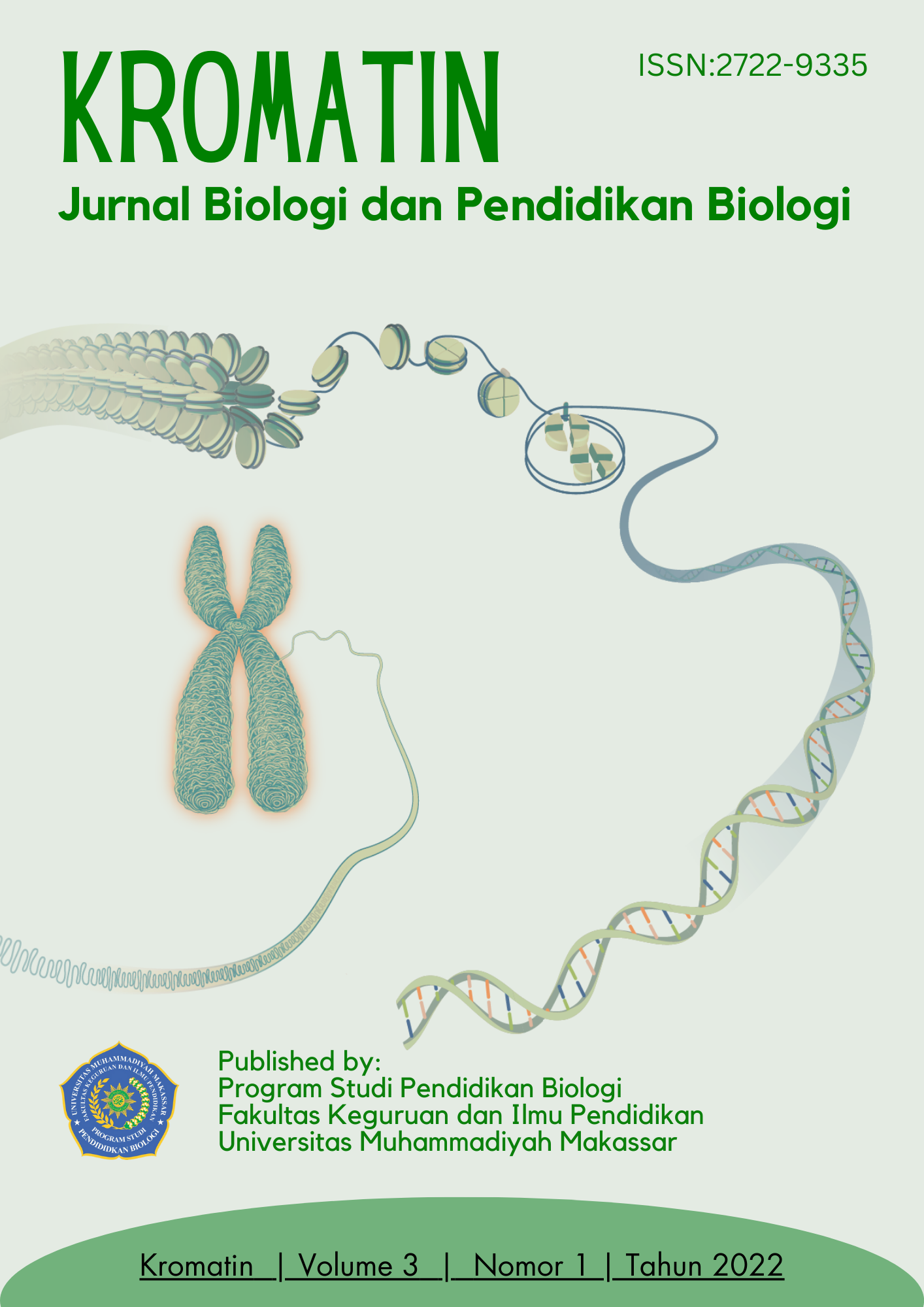PENINGKATAN HASIL BELAJAR PADA KONSEP PLANTAE MELALUI MODEL PEMBELAJARAN INKUIRI DENGAN PEMANFAATAN LINGKUNGAN SEKOLAH
Kata Kunci:
Inquiry learning, learning outcomes, biology, plantaeAbstrak
The purpose of this research is to find out the increase in learning outcomes of the inquiry learning model on Plantae material can improve student learning outcomes in class X SMA Negeri 1 Sarudu. This research is a class action research which is often referred to as Classroom Action Research. This research was conducted in class X SMA Negeri 1 Sarudu which is located at Jln. Nunu, Sarudu sub-district, West Sulawesi Province, was held in the even semester from October to December, the first week of 2020. The subjects in this study were class X students in the Plantae biology subject. The selection of this subject was based on interviews with teachers and observations that when the learning process took place in class X, there were 30 students. above can be seen in Cycle I the average student learning completeness was 55.56% as many as 10 students who completed exceeding the KKM while 44.44% as many as 8 students who did not complete learning using the inquiry method. While in Cycle II, the average student learning completeness was 77.78%, 14 students who completed exceeded the KKM, while 22.22%, 4 students did not complete. The conclusions from this study are: the use of the inquiry method can increase the activity and learning outcomes of class X students of SMA Negeri 1 Sarudu.
Keywords:
Referensi
Agi, Ginanjar. Pengaruh Metode Inkuiri Terhadap hasil belajar Siswa SMP. Jurnal Pendidikan. 45(2). Hal 123-129
Arikunto, dkk. 2017. Penelitian Tindakan Kelas. Jakarta: PT Bumi Aksara
Bakhtiar, S. 2011. Biologi Untuk SMA dan MA Kelas XI. Jakarta: PT. Sarana Panca
Dimyati & Mudjiono. 2014. Belajar dan Pembelajaran. Jakarta: PT Rineka Cipta.
Emda,2017. Kedudukan hasil Belajar Siswa dalam Pembelajaran. Jurnal Lantanida. 5(2). Hal 93-196
Gulo, M. 2017. Strategi Pembelajaran. Bandung: Rosdakarya.
Mulyasa, E. 2014. Menjadi Guru Profesional Menciptakan Pembelajaran Kreatif dan Menyenangkan. Bandung: Rosdakarya.
Pendrice. 2018. Penerapan Model Pembelajaran Inkuiri Terbimbing untuk Meningkatkan Kompetensi Siswa dalam Pembelajaran Biologi. Jurnal Pendidikan Biologi. 8(1).
Putra, Nurrahman. 2018. Strategi Belajar dan Mengajar Biologi. Malang: UM
Purwanto. 2015 Pengaruh Metode Inkuiri Terhadap hasil Belajar Siswa SMA. Jurnal Pendidikan. 45(2). Hal 123-129.
Parwono.2017. Pengaruh Metode Inkuiri Terhadap hasil Belajar Siswa SMA. Jurnal Pendidikan. 45(2). Hal 124-129
Sanjaya, W. 2015. Strategi Pembelajaran. Jakarta: Kencana Prenada MediaGroup.
Suryobroto, K, N. 2016. Strategi Belajar Mengajar. Jakarta: Rineka Cipta.
Sadiman. 2017. Interaksi dan hasil Belajar Mengajar. Jakarta: Rajawali Press.
Syardiansyah. 2016. Strategi belajar dan mengajar. Jakarta: Kencana Prenada Media
Umami, R., Marungkil, P., & Amra R. 2011. Penerapan Metode Inkuiri untuk Meningkatkan Hasil Belajar Siswa Kelas IV Inspers Bajawali Kecamatan Lariang Kabupaten Mamuju Utara. Jurnal Kreatif Tadulako Online. 3(2).
Hosnan.2014. Pengalaman belajar poko model pembelajaran inkuiri. Bandung:PT Remaja
Rosdakarya Rizqi, A.F. 2018. Faktor-Faktor yang Mempengaruhi hasil Belajar Siswa Kelas VIII SMP Negeri Natar Lampung Selatan. Skripsi (S1). Universitas Lampung
Mahmud, H. dkk. 2019. Pembelajaran model inkuiri dan hasil Belajar siswa. Journal of Islamic Education Management. Vol. 4 (1)
Sastroprawiro, W.N. 2011. The Missing Abundance Mentality in Our Curriculum dalam Seri Pemikiran Mahasiswa: Ekonomi Indonesia di Mata Anak Muda UI. FEUI: Baduose
Unduhan
Diterbitkan
Terbitan
Bagian
Lisensi
Authors who publish with this journal agree to the following terms:
1. Authors retain copyright and grant the journal right of first publication with the work simultaneously licensed under a Creative Commons Attribution 4.0 Internasional License that allows others to share the work with an acknowledgement of the work's authorship and initial publication in this journal.
2. Authors are able to enter into separate, additional contractual arrangements for the non-exclusive distribution of the journal's published version of the work (e.g., post it to an institutional repository or publish it in a book), with an acknowledgement of its initial publication in this journal.
3. Authors are permitted and encouraged to post their work online (e.g., in institutional repositories or on their website) prior to and during the submission process, as it can lead to productive exchanges, as well as earlier and greater citation of published work.
Licence:
Authors are free to:
1. Share: Copy and redistribute the material in any medium or format
2. Adapt: Remix, transform, and build upon the material for any purpose, even commercially.
The licensor cannot revoke these freedoms as long as the authors follow the license terms, which include the following:
1. Attribution: Authors must give appropriate credit, provide a link to the license, and indicate if changes were made. Authors may do so in any reasonable manner, but not in any way that suggests the licensor endorses the authors or authors’ use.
2. No additional restrictions: Authors may not apply legal terms or technological measures that legally restrict others from doing anything the license permits.
This work is licensed under a licensed under a Creative Commons Attribution 4.0 Internasional License/ CC BY 4.0.


